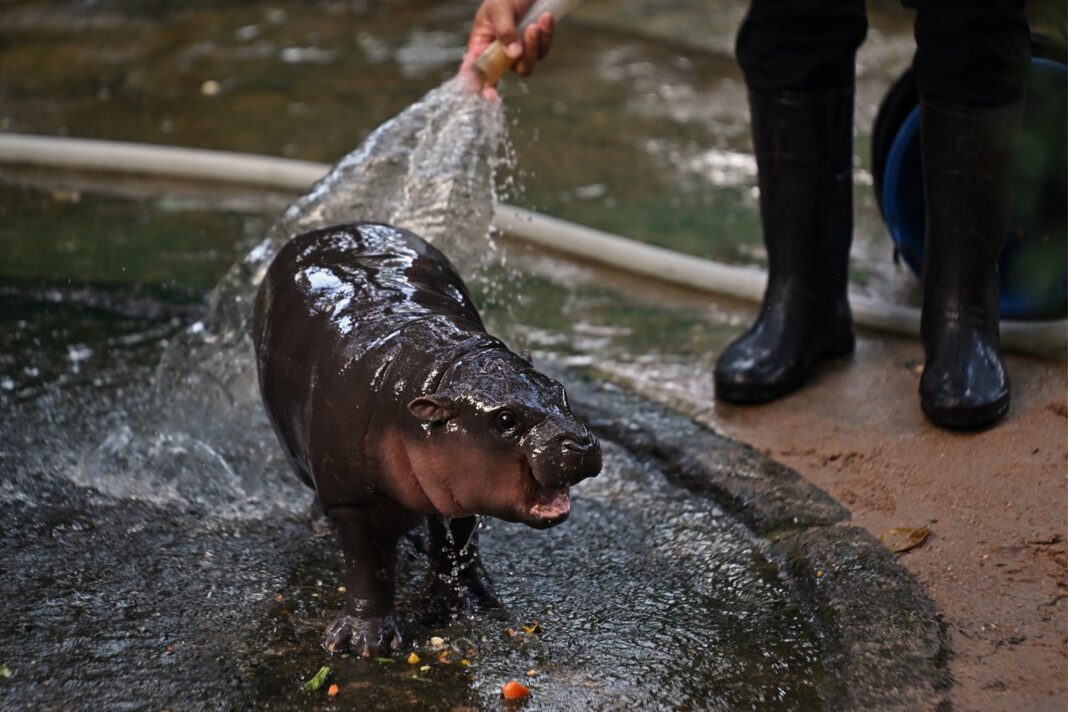If you’ve been on the internet in the past two weeks, you have likely seen a video of a miniature hippopotamus gallivanting in the puddles of a Thailand zoo. Her name is Moo Deng, she is 2 months old, and she has built quite a reputation for her surly attitude. She has taken big, toothless chomps out of the legs of attending zookeepers, unhinged her jaw to appear as if she is screaming in either joy or existential horror, and done a lot of sleeping in between. It doesn’t take much to become a viral star in 2024, and Moo Deng’s cuteness has overloaded the algorithm. She’s everywhere, from bootleg T-shirts to the social feeds of baseball teams, and she won’t be leaving anytime soon.
But what you might not be aware of is that Moo Deng is a pygmy hippo, a species that is exceptionally rare. Physiologically, pygmy hippos are significantly smaller than their cousins, and it is estimated that only 3,000 exist in the wilds of West Africa. Beyond her adorable face and winning demeanor, Moo Deng’s existence alone is a major story in conservation circles. That’s why I reached out to Rebecca Lewison, a conservation ecologist at San Diego State University who studies hippos. Lewison shed light on the unique proclivities that pygmy hippos like Moo Deng share and, more importantly, the various environmental factors that have pushed this unique class of animal toward extinction. Our conversation has been edited and condensed for clarity.
There aren’t a lot of hippo experts. How did you become one?
Rebecca Lewison: I was in graduate school, studying ecology, and I kind of just fell into a project that was focused on hippos in Western Tanzania. It unfolded from there. There aren’t many people who work on common hippos, and even fewer who study pygmy hippos, in part because we only have one picture of pygmy hippos in the wild. (It literally got taken last year, by a remote camera.) They’re super cryptic and rare.
Common hippos are obviously not cryptic or rare, but there are still not very many experts on them because they’re really tough to study—they’re in the water all the time. So, honestly, I feel like I got the crown because there aren’t too many other people to take it.
Why are pygmy hippos so rare?
They are only found in a handful of countries in West Africa, and they also rely on pretty intact forests, which exist less and less as deforestation sweeps across the region. And so that combination of a fairly constrained geographic range and an association with intact forests in West Africa is why we see small, declining populations of pygmy hippos. My guess is they probably never occurred in large numbers like common hippos. They’re solitary. We find them in ones and twos—like, maybe a female and an offspring—but they don’t aggregate in groups the way we see larger hippos do. People also hunt them.
You mentioned that we snapped our first photo of a pygmy hippo in the wild only last year. Was that a big deal in your world?
Huge. And the best part about it is, I was talking to the Explorers Club about hippos, and I had just said, in this recorded webinar, “They’ve never captured a picture of a pygmy hippo in the wild.” Literally the next day, that photo was in the news. So, yeah, it’s very recent. But it’s not that we didn’t know they exist—there are records of them being in captivity. It’s not an “ivory billed woodpecker”–type big deal.
Are pygmy hippos known to behave any differently from common hippos? Moo Deng seems especially playful and is always biting and screaming at the zookeepers. Is that a special facet of her personality, or are all young hippos like that?
No one knows! No one has ever witnessed pygmy hippo baby behavior before, because we hadn’t even seen adult pygmy hippos until last year. (And no one was observing them—it was just a remote camera that captured an image.) But from my experience with common hippos, nothing about Moo Deng strikes me as particularly unique. She just seems like a feisty young hippo. I’ve seen common hippos being born, and I’ve seen them in the wild. They’re playful and feisty—adorable, as everyone knows. For common hippos, the birth that I saw, at least, was in the water, so they’re in the water right away. Everyone knows that common hippos can’t swim, but baby hippos basically use their mom as a raft.
Why is her mouth always open? She always seems to be in the middle of a lightning-bolt-shriek moment.
Baby hippos are just like that.
I also have to say that I was pretty concerned—and this is not throwing shade at the captive facility—to hear that they took Moo Deng off exhibit because people were throwing things at her. Having a pygmy hippo born in captivity doesn’t happen that often, and I wish that people who were there recognized the risk that they put a captive animal in whenever anyone puts anything into the enclosure.
I wonder if that’s because the rarity of pygmy hippos hasn’t quite penetrated the mainstream in the way that, say, endangered pandas have.
People don’t understand that hippos—and I think both species, but obviously pygmy hippos—are endangered. This is a species that really deserves attention. But even with common hippos, their conservation status is not assured. Their populations are declining, their ranges are declining, their access to water is declining. We need people to recognize that there are other species out there we should be paying attention to and concerned about, and pygmy hippos are for sure one of those species.
Are there any other hippos that are as interesting as Moo Deng?
In South Africa, there are families that have hippos as pets. They come to the house every day. And it’s interesting because the thing that I get asked the most about common hippos is “Don’t they kill more people than any other animal in Africa?” I don’t know who made up that statistic. I do, however, think hippo–human conflict is increasing because they’re losing habitat, water, and land. I think the same thing is happening with pygmy hippos as well, but we just don’t see these acts of aggression because they don’t tend to be the size of a VW bus.
Then we had a baby common hippo named Fiona in the U.S. who had some complications at birth, and she captured people’s hearts because it was such an amazing feat to keep her alive and thriving. I think with Moo Deng it’s the same thing. No press is bad press. We need more people to be paying attention. We can’t expect these animals to thrive and exist if we are destroying their habitat.
I appreciate the pressure that people have in West Africa, but what we need is a way to coexist in a sustainable way forward—hopefully for both of us, and I think pygmy hippos are absolutely deserving of the spotlight. There are people who probably didn’t even know that pygmy hippos exist. They’re like, Wait a minute—there’s a small one? I think that’s great.




